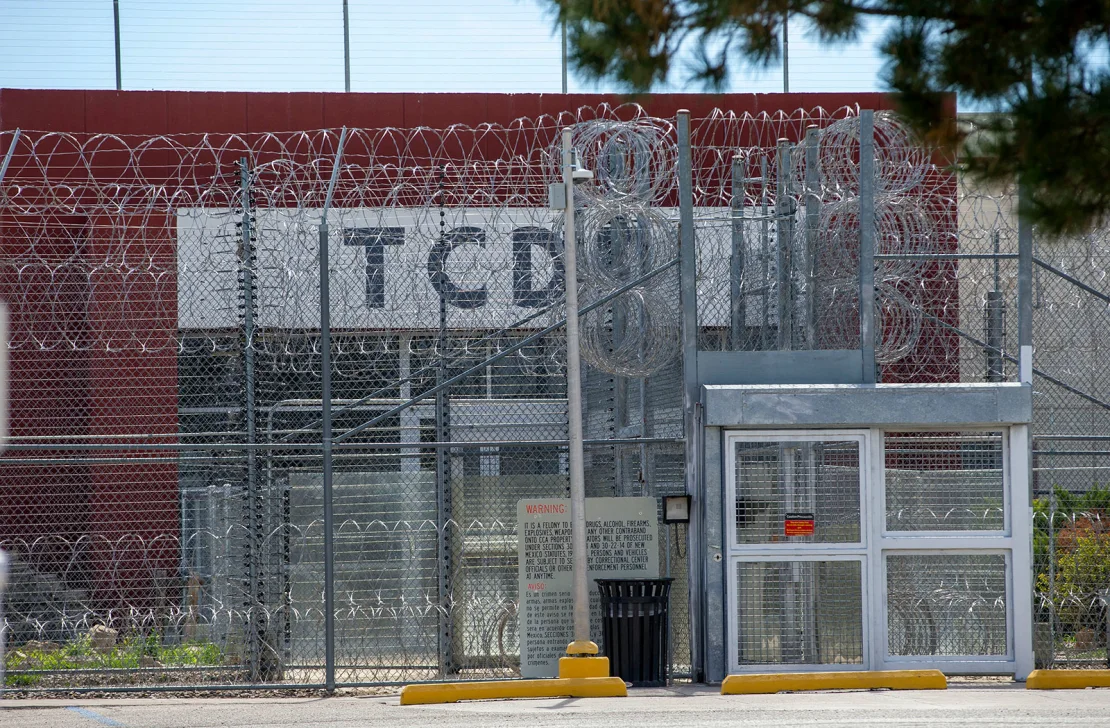In a daring promise made to Americans on the campaign trail a little over four years ago, Joe Biden promised to abolish the federal government’s use of private prisons. These institutions have a history of convicts complaining about cruel treatment.
But as he stepped out from office last month, Biden’s record on that issue was inadequate: although ending contracts with private prisons for the Bureau of Prisons, he permitted their expansion by Immigration and Customs Enforcement.
The number of individuals housed in private prisons by the federal government has increased since Biden assumed office, mostly due to ICE detainees, according to statistics retrieved by the ACLU via a FOIA request and shared with AWN.
Furthermore, President Trump was able to swiftly increase their use to house illegal immigrants because of Biden’s decision to exclude ICE from his private jail laws.
One of the several executive orders that Trump issued on the day of his inauguration was one that reversed Biden’s rule on private prisons. However, this wasn’t the first time ICE sought proposals from private prison companies like Geo Group and CoreCivic to increase private prison capacity in seven states this year: California, Kansas, Nevada, New Jersey, New Mexico, Texas, and Washington. This request came in the last months of the Biden administration. This change was made in spite of the fact that several private jails have been accused of having bad facilities and mistreating inmates for quite some time.
Companies’ shareholders anticipate a windfall from Trump’s administration. Outperforming the overall stock market, Geo Group and CoreCivic both had significant price increases of 133% and 60%, respectively, between November 30th and January 20th, the dates of Trump’s inauguration.
“They will essentially profit off every step of this process: the detention, the monitoring, the deportation,” stated Bianca Tylek, founder and executive director of Worth Rises, an advocacy charity who is opposed to privatized prisons. “This is the lucky break they’ve been anticipating.”
Switching to incarcerating immigrants
Private prison corporations’ earnings have been on the upswing during Republican regimes and the other way around under Democratic ones over the past few decades.
After an inspector general study revealed that privately managed prisons were more violent than publicly run ones, President Obama instructed the Department of Justice to stop using private prisons in 2016. During his first term in office, Trump reversed that order. Concerns comparable to those that prompted Obama’s directive five years prior prompted Biden to rescind the federal Bureau of Prisons’ contracts with private prisons in 2021. The United States Marshals Service, which houses most people awaiting trial, was also included in Biden’s directive.
Nonetheless, private prison corporations successfully redirected government contracts to include immigrant detention.
The number of immigrants held in private prisons under ICE contracts increased from over 24,000 to over 35,000 during Biden’s term, while the number of federal detainees in private prisons under the Bureau of Prisons contracts decreased from over 14,000 to zero. An research by the American Civil Liberties Union found that private prisons housed over 90% of immigration prisoners by the conclusion of Biden’s tenure, which was about the same percentage as at the end of Trump’s first term. In addition, compared to when Biden took office, the number of federal inmates held by private prisons increased by about 9,000.
This increase occurred although allegations of maltreatment and abuse in private facilities persisted. A California detention center is the site of a case in which present and past inmates are suing Geo Group, claiming that the company exposed them to dangerous chemicals. Inmates at another Geo Group prison in Tacoma, Washington, have gone on multiple hunger strikes over what they see as subpar medical treatment and food.
Staffing shortages at a CoreCivic prison in Tennessee allegedly put inmates at risk of physical and sexual abuse, prompting an investigation by the civil rights division of the Department of Justice. The division’s next move is uncertain in light of a recent directive from the Justice Department to halt any pending litigation originating from the Biden administration.
An representative from CoreCivic informed AWN that the business’s facilities “adhere to all ICE standards and are monitored by ICE officials on a daily basis,” adding that the facilities “operate with a significant amount of oversight and accountability.”
In addition to its ongoing battle against a wrongful death case, the corporation has denied allegations of maltreatment of inmates at one of its immigration detention centers in New Mexico. “We continue to hear claims about our immigration facilities that simply don’t reflect the quality of the services provided or the professionalism of our team,” stated Ryan Gustin, spokeswoman for CoreCivic.
These kinds of problems have been around for a while. According to heavily redacted documents that AWN obtained through public records requests, numerous ICE contract facilities’ inmates went on hunger strikes during Trump’s first term in office as a form of protest against their treatment. These facilities were located in states such as Arizona, California, Georgia, Illinois, Minnesota, New Jersey, New Mexico, Texas, and Washington. Not much is known about these hunger strikes. Denial of medical treatment, bad circumstances, and allegations about physical and sexual assault of inmates are common threads throughout prisons, according to organizations that have dealt with hunger strikers. The reasons behind the strikes are not revealed.
In response to questions from AWN, Geo Group released a statement stating that they partner with government agencies “to ensure that all persons entrusted to our care are treated in a safe, secure and humane manner” and that all of their facilities “are closely monitored in accordance with government contract standards.” It went on to say, “Our belief is that politically motivated outside groups instigate and coordinate many instances of hunger strikes at GEO-Contracted ICE Processing Centers.”
A lower court ruling against Geo Group was upheld on January 16 by the US Ninth Circuit Court of Appeals. The ruling states that Geo Group must pay $23.2 million in back pay to the state of Washington and past inmates at the Northwest Detention Center in Tacoma for forcing inmates to work for $1 a day or less instead of the state minimum wage. Additionally, the court mandated that incarcerated laborers be paid the current state minimum wage of $16.66 per hour.
In a statement, Geo Group brought attention to the fact that the Department of Justice had reached a consensus with the firm about the violation of intergovernmental immunity principles that would result from enforcing state minimum wage laws. There will be “vigorous pursuit of all available appeals” since the corporation “strongly disagrees with this decision.”
“Thousands upon thousands, if not millions,”
The largest jail contractor for ICE, Geo Group, has made great efforts to establish connections with both the new government and ICE. One monitoring organization found that in the 2024 campaign, it was the first firm of any type to have its PAC donate all it could to a Trump super PAC.
Nine high-ranking ICE officials have departed for Geo Group in the past few years, according to AWN’s investigation.
On the corporate earnings call that took place just days after Trump’s win, Geo Group CEO Brian Evans spoke highly of the company’s future and its prospects, predicting that yearly sales may increase by $400 million. In anticipation of “potentially unprecedented future growth opportunities” under Trump, the business revealed a $70 million investment the next month to increase capacity to meet the demands of ICE’s immigration detention facilities.
Speaking on the earnings conference, Wayne Calabrese, president of Geo Group, informed ICE that the company could quickly increase its capacity to monitor and control hundreds of thousands—if not millions—of people. Subsidiaries of Geo Group include businesses that supply ankle monitors and other tracking devices as well as transportation for immigration prisoners.
Trump reiterated his campaign pledge to deport large numbers of people in his inauguration speech. “Millions and millions of criminal aliens will be returned to their places of origin,” he announced.
The president’s broad executive orders sought to terminate birthright citizenship, end several refugee and asylum safeguards, and set the stage for large deportations. Dr. Phil McGraw, a former TV talk show personality, was “embedded” with an ICE unit in Chicago during one of the widely publicized immigration sweeps that the Trump administration conducted in its first week in office.







